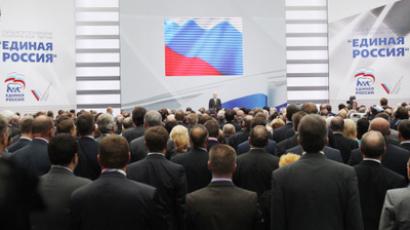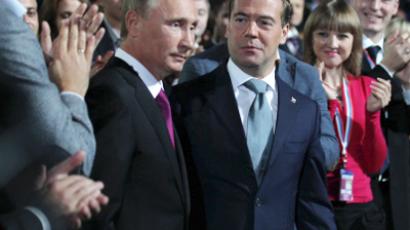'Tandem swap could take Russia to new political era'
With Vladimir Putin as president and Dmitry Medvedev as prime minister, Russia will step into a new political reality, believes Sergey Brilev, political commentator and member of Russia’s Council for Foreign and Defense Policy.
“Firstly, Medvedev will bring liberal votes for the United Russia party because he is, of course, associated with a liberal agenda and secondly, those things which have been inserted into the Russian political agenda, such as political and economic modernization and innovations, these are things that are normally associated with Medvedev’s name,” he said. “If he becomes a reformist prime minister under super popular President Putin, that takes us to a new political reality,” Brilev added. “It brings us to a reality where Putin, who is normally associated with a strong-handed sort of politics could indeed inevitably set out quite a liberal economic agenda, which will be carried out by Medvedev.” According to Sergey Brilev, the United Russia party is also now going through serious transformations, becoming a ruling party which is capable of “producing a new generation of leaders.” ”This is really something new for Russian politics,” he concluded. Russian political expert Igor Khokhlov, a researcher with the Moscow-based Institute of World Economy and International Relations, believes that the most important thing for the leader is to “do good for his own country,” and he says that Putin has become extremely popular both inside and outside Russia for what he has done since 1999.“I think the most important criterion is the effectiveness of how the leader works for his own nation,” he said. “On the other hand, I find Putin very popular outside, because Russia has been conducting a very reasonable policy following all its international agreements for those 12 years. And our foreign partners can feel there is a strategy, it is logical, it is quite expected. But of course Russia protects its own interests, it is quite natural.”One of the major issues between Moscow and Washington since the Bush administration was the construction of a missile defense system in the back garden of Russia. President Medvedev has voiced his frustration and his opposition to that, but some believe his position was not firm enough. Nevertheless, Khokhlov believes that Russian foreign policy is indeed very logical.“There were a few pillars of global stability built in the 70s by the Soviet Union and the United States, and Bush’s administration has contributed a lot to removing those pillars,” he said. “Russian foreign policy is very logical. The idea is to continue the cooperation that existed in the Soviet era in building that stability. And in this case, adding extra missile defense in Europe or anywhere else is actually removing those pillars of stability.”Igor Khokhlov believes that “results and stability” are the two most “highly valued commodities” in Russian political life.“The Russian economy has been constantly rebuilding under Putin’s rule and then under Medvedev’s rule,” he said. “And Medvedev set very ambitious goals during his presidency: the modernization of Russia and moving Russia ahead, based on the resources Russia has.”
‘Russian economic system needs shake-up’
Michael Binyon, a foreign affairs specialist from The Times, told RT that the tandem swap was “inevitable” and “logical”, as he believes that for the last four years Putin has remained a major political force in the country.“It was quite clear that Mr. Putin was the stronger force, even during the four years when President Medvedev was holding the job,” he said. “I think it makes logical sense to have the person who has all the time been calling the shots to actually be head of state.”Binyon says that the idea of Vladimir Putin being the next Russian president will not necessarily be welcomed in the West, which finds Medvedev to be a much more convenient international partner.“I don’t think Mr. Putin will be as accommodating to other Western or any other leaders as Mr. Medvedev was,” he said. “And I think it is going to be more difficult to find him as a member of a kind of international team, a sort of team player.” Binyon also pointed out the different approaches of Putin and Medvedev towards internal reforms.“[Putin] has not been so forceful in talking about the need for internal reforms in Russia, particularly such things as changing the laws on transparency and making it easier for businessmen to invest,” he said. “Mr. Medvedev was very outspoken on that. The problem was that he did not actually appear to put much of it into practice.”“I think Mr. Medvedev, obviously, if he now continues as a prime minister, will preside over very similar policies to what we have been seeing for the past few years,” he added.Binyon believes that the objective factors for further modernization are in Russia’s favor, as it has large oil reserves and resources, but he says that the system urgently needs “a shake-up.”“[The system needs] less state capitalism, more enterprise by entrepreneurs, and overwhelmingly a real sharp attack on corruption,” he said. “And it does need a little bit more foreign investment and foreign expertise. Although Russia has plenty of its own, it needs a broader spectrum of outside interest.”
Andrey Kortunov, vice president of the Eurasia Foundation, hopes that Dmitry Medvedev will find ways to continue his initiatives towards modernization when he becomes Russia’s prime minister.”It is evident that Russia needs innovation. Russia needs modernization,” he said. “We need to move away from an energy economy to a knowledge-based economy. We need to pay much more attention to small business. We need to reform and to modernize our financial system, so there are ways in which we can protect ourselves against the downturns of global markets and I hope that this is something that the new president and the new prime minister will concentrate on.”














